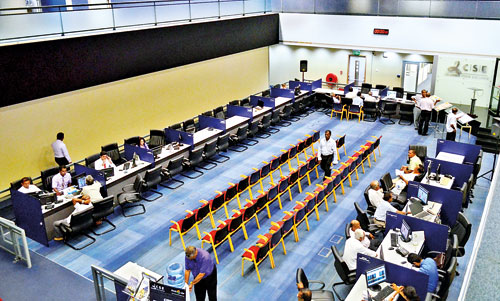One more year of fire-fighting, stock brokers say

File pic of the Colombo Stock Exchange
Most Sri Lankan stock brokers are giving just another (troubled) year for their very survival in the industry as the market continues in its dull and drab momentum. “After that, who knows,” said one exasperated dealer.
The last straw was the directive issued by the Securities and Exchange Commission (SEC) earlier this month mandating all licensed stock brokers and stock dealers trading in equity and/or debt securities to fulfil and maintain a minimum requirement of shareholder funds. According to the regulator, this was done to strengthen the financial position of such brokers and dealers irrespective of losses sustained in the past as part of a risk assessment framework. It was also the view of the SEC that mandating a minimum shareholder’s fund requirement will uplift the standards of stock brokers and stock dealers and equip them better to play a greater role in the development of the market.
Now all licensed stock brokers and/or stock dealer firms trading in equity and/or debt securities are directed to maintain a minimum shareholder’s fund requirement of Rs. 100 million or 50 per cent of the firm’s stated capital, whichever is higher.
The capital market industry has become, since of late an exceedingly unstable business with no clear growth trend. Industry revenues figures aren’t pretty and the latest directive will further squeeze their bottom lines.
These firms have cut back on many costs since the crisis in the CSE nearly three years ago, but to no avail. It’s hard to rally in profits, they say adding that some new firms, after retrenching staff are mulling ‘cold storage’ of their licenses which is when a stock broker can hold on to their licenses, but not trade. The SEC’s new rules in capital adequacy which direct the implementation of a risk based Capital Adequacy Requirement (CAR) of 1.2 times the risk requirement of stock brokers subject to a minimum liquid capital requirement of Rs. 35 million wasn’t well received as well.
What’s the main objective of all this? Well, for starters, it seems that the regulators want to wean out the bad eggs or the ones who spell trouble. The ‘big’ guys will welcome this latest proposal.
This weaning out has the blessings of the Treasury as well. In order to make this industry robust there is a need for stronger firms. And that’s only possible through consolidation is what the Treasury has told both CSE and the SEC, informed sources told the Business Times.
However, the SEC’s request from the CSE to review the transaction fees applicable to CSE and CDS which are currently in force by adopting a step-up fee structure rather than the present flat fee structure when consolidating transactions was welcomed by the industry. Increasing the threshold for the two-band fee from the present Rs. 50 million to Rs. 100 million was a good proposal, many say. But it’ll do little to cure their wounds.


